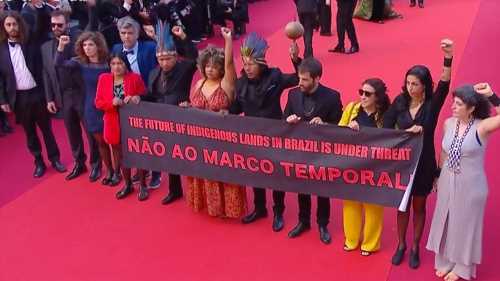The red carpet for Wednesday’s premiere of Tran Anh Hung’s “The Pot au Feu,” with Juliette Binoche and Benoit Magimel, was the scene of a demonstration in support of the land rights of the Indigenous peoples of Brazil.
The protest was led by the official delegation of “The Buriti Flower,” a film showing in the Un Certain Regard sidebar directed by Portugal’s João Salaviza and Renée Nader Messora and sold by Films Boutique.
Appearing in front of the banks of photographers, the directors along with the actors wearing traditional dress, Francisco Hyjno Krahô, Debora Sodre, Luzia Cruwakwyj Krahô and Henrique Ihjac Krahô, unfurled a large banner with the slogan “Não ao Marco Temporal: The Future of Indigenous Lands in Brazil is Under Threat”.
One of the main actors, Francisco Hyjno Krahô traveled from his remote village to attend the premiere in Cannes. He explained to Variety the meaning of the Maraca he held at the demonstration: “The Maraca represents the world. When we move it, we also make the world keep spinning around. Inside the Maraca are the seeds making noise, and the seeds represent us people.” Director Salvizza told Variety: “Some of the photographers shouted their support and were very happy.”
The protest is specifically aimed at a proposed law which would limit the constitutional rights of the indigenous people only to the lands which they had under their ownership on the deadline of Oct. 5, 1988, the date of the promulgation of the Brazilian Constitution, ignoring the fact that under the military dictatorship indigenous peoples were unable to fight for their rights. Supported by conservative deputies from the party of the former President Jair Bolsanaro, the law would severely restrict the ability of indigenous peoples to protect their lands from exploitation.
Shot in the Krahôlandia Indigenous Land for over a year, “The Buriti Flower” tells the story of the Krahô community and their attempt to resist exploitation as well as come to terms with their changing identity in a modern world.
In 2018, Salaviza and Messora’s “The Dead And The Others” won the Un Certain Regard Special Jury Prize. Salaviza is Portuguese and Messora, Brazilian.
Messora told Variety: “We both have a very, very long relationship with the Krahô people. This is not just a film project: We really have a connection with the community. We are spending long periods of time with them and will continue to develop something.”
Although protests have been common in Cannes throughout the years, this edition saw a ban on political demonstrations in the area immediately around the Palais in anticipation of possible disruption linked to the pension reforms in France. This has not, however, stopped filmmakers like Salaviza and Messora taking advantage of the media spotlight to highlight their cause.
Read More About:
Source: Read Full Article

